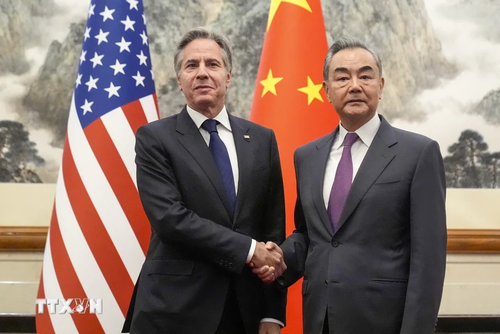Negotiating Tariffs: Switzerland And China Emphasize Dialogue

Table of Contents
Switzerland's Approach to Tariff Negotiations with China
Switzerland, known for its robust and export-oriented economy, approaches tariff negotiations with China strategically. Their approach centers on two key pillars: fostering bilateral agreements and establishing effective dispute resolution mechanisms.
Focus on Bilateral Agreements
Switzerland prioritizes bilateral trade agreements to establish clear frameworks and reduce uncertainties for Swiss businesses operating in the Chinese market. This avoids the complexities of multilateral negotiations and allows for targeted solutions addressing specific tariff concerns.
- Specific examples: Switzerland's successful bilateral agreements with China have resulted in reduced tariffs on various Swiss products, including pharmaceuticals, watches, and precision instruments. These agreements often include provisions for increased market access and simplified customs procedures. For instance, the agreement signed in 2013 significantly improved access for Swiss financial services companies.
- Proactive engagement: Switzerland maintains consistent and high-level dialogue with Chinese officials, engaging in regular consultations and working groups to address emerging tariff issues proactively. This proactive stance ensures that potential problems are tackled early, preventing escalation.
- Transparency and predictability: The emphasis on transparency in bilateral agreements provides predictability for Swiss businesses, enabling them to make informed investment decisions and plan their operations effectively within the Chinese market. Clear rules and regulations minimize the risks associated with fluctuating tariffs.
Emphasis on Dispute Resolution Mechanisms
Efficient and transparent dispute resolution mechanisms are crucial to Switzerland's approach. This ensures fair treatment for Swiss businesses and minimizes the potential for escalating tariff conflicts.
- Existing channels: Switzerland and China have established several channels for resolving trade disputes, including consultations under the existing bilateral investment treaty and the utilization of the World Trade Organization (WTO) dispute settlement system as a last resort.
- Effectiveness: While not all disputes have been resolved swiftly, the existing mechanisms have generally proven effective in addressing specific tariff-related concerns. Both nations often find common ground through direct dialogue before escalating the matter.
- Potential improvements: Both countries continually review and refine their dispute resolution processes to ensure efficiency and effectiveness. Discussions are ongoing to explore further enhancements to streamline the process and ensure swift resolution of future disputes.
China's Stance on Tariff Negotiations with Switzerland
China's approach to tariff negotiations with Switzerland reflects its broader economic goals and commitment to fostering stable, mutually beneficial trade relationships.
Importance of Stable Trade Relations
China values its economic relationship with Switzerland and seeks to maintain stable trade flows. This underscores the importance of resolving tariff disputes constructively to avoid disruptions to this valuable partnership.
- Commitment to stability: China's consistent engagement with Switzerland in bilateral dialogues demonstrates its commitment to maintaining a stable and predictable trading environment. This stability benefits both economies.
- Economic benefits: Switzerland serves as an important trading partner for China, particularly in high-value-added goods and services. Maintaining favorable trade relations safeguards China's access to these crucial markets.
- Broader trade strategies: China's approach to negotiations with Switzerland aligns with its broader strategy of promoting multilateralism and deepening economic ties with key partners globally.
Promoting Fair Competition
China emphasizes fair competition and aims to create a level playing field for both domestic and international businesses. This principle guides its approach to tariff negotiations with Switzerland.
- Fair competition policies: China's policies aim to ensure market access for foreign businesses while also protecting its domestic industries. This balance is a key consideration in tariff negotiations.
- Effectiveness of policies: The effectiveness of these policies is a subject of ongoing discussion. Switzerland, like other nations, occasionally raises concerns about market access and competitive practices within China.
- Addressing concerns: Open communication and dialogue are essential to addressing Swiss concerns related to fair competition and market access, forming the cornerstone of successful tariff negotiations.
The Role of Dialogue and Diplomacy in Resolving Tariff Disputes
The success of tariff negotiations between Switzerland and China rests significantly on the strength of their diplomatic relations and the commitment to open communication.
Importance of Open Communication
Both countries recognize the crucial role of open communication and diplomatic engagement in reaching mutually beneficial outcomes. Regular high-level dialogues are essential for maintaining a constructive relationship.
- High-level dialogues: Regular meetings between Swiss and Chinese ministers and officials facilitate direct communication, allowing for swift addressing of concerns and the exploration of potential solutions.
- Discussion topics: These dialogues cover a wide range of issues, from specific tariff concerns to broader aspects of trade and economic cooperation, facilitating a holistic approach to resolving disputes.
- Effectiveness of dialogues: These dialogues have proven effective in preventing escalation of disputes and fostering a collaborative atmosphere, creating opportunities for compromise.
Seeking Common Ground
The focus is on finding common ground to minimize disruptions to bilateral trade and foster economic cooperation. This necessitates a flexible approach from both sides.
- Areas of compromise: Both countries identify areas where mutual benefit can be achieved through compromise. This might involve phased reductions in tariffs or the development of joint initiatives that support both economies.
- Collaborative projects: Exploring opportunities for joint research and development, particularly in sectors like pharmaceuticals and technology, promotes stronger collaboration and mutual economic growth.
- Achieving solutions: Reaching mutually acceptable solutions requires understanding each country's priorities and concerns. This necessitates flexibility and a willingness to compromise from both sides.
Conclusion
The ongoing negotiations surrounding tariffs between Switzerland and China highlight the importance of dialogue and diplomacy in resolving complex trade disputes. Both nations have prioritized open communication and finding mutually beneficial solutions. By focusing on bilateral agreements, dispute resolution mechanisms, and fostering fair competition, Switzerland and China aim to maintain stable and productive trade relations. Continued engagement and a commitment to finding common ground are vital for successfully navigating these challenges and fostering a strong economic partnership. Understanding the nuances of negotiating tariffs is crucial for all businesses operating within this dynamic bilateral relationship. Learn more about successful strategies for negotiating tariffs and navigating international trade complexities.

Featured Posts
-
 The Goldbergs A Complete Guide To The Hit Tv Show
May 21, 2025
The Goldbergs A Complete Guide To The Hit Tv Show
May 21, 2025 -
 Antiques Roadshow Couple Arrested After National Treasure Appraisal
May 21, 2025
Antiques Roadshow Couple Arrested After National Treasure Appraisal
May 21, 2025 -
 Sabalenkas Dominant Performance At Madrid Open Victory Over Mertens
May 21, 2025
Sabalenkas Dominant Performance At Madrid Open Victory Over Mertens
May 21, 2025 -
 Bbc Antiques Roadshow Couple Jailed For Unknowingly Trafficking National Treasure
May 21, 2025
Bbc Antiques Roadshow Couple Jailed For Unknowingly Trafficking National Treasure
May 21, 2025 -
 Sharath Kamals Emotional Farewell At Wtt Contender Chennai 2025
May 21, 2025
Sharath Kamals Emotional Farewell At Wtt Contender Chennai 2025
May 21, 2025
